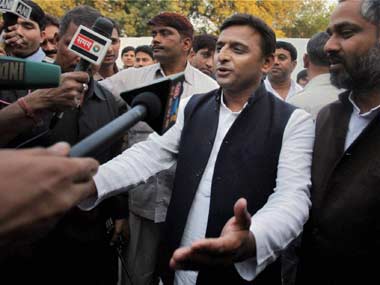The results of the assembly by-elections in Uttar Pradesh have proved why Chief Minister Akhilesh Yadav was so nonchalant towards the campaigning — he even flew off for a Europe tour when electioneering was at its peak. He wanted the party to get its act together, and it did. The ruling Samajwadi Party won eight out of 11 assembly seats. The victory is a shot in the arm for the beleaguered party and it’s all the more sweeter because it comes at the cost of the BJP. The latter paid the price for its arrogance and for underestimating the intelligence of the voter. It wanted to play the polarisation game again, the voters said enough. [caption id=“attachment_1715097” align=“alignleft” width=“380”]  Uttar Pradesh chief minister Akhilesh Yadav. PTI[/caption] While the impact of the BJP’s defeat will be known in days to come, some quick takeaways from the UP results that are obvious. · The voter polarisation trick had lost its transient appeal and the SP realised it quicker than the BJP. · Keeping senior minister Mohammad Azam Khan out of the campaigning was a right decision of the Samajwadi Party. He thus did not get an opportunity to divide voters along Hindu-Muslim lines. · The SP took a calculated risk by not putting up too many Muslim candidates. It experimented only with one, in Thakurdwara near Moradabad who won. The gambit paid off: By fielding non-Muslim candidates in rest of the constituencies, it deprived the BJP of the chance to appeal to voters along the lines of candidate’s religion. · SP president Mulayam Singh Yadav also did not campaign anywhere except Mainpuri where his grand-nephew was fielded to retain the seat which Mulayam himself had vacated. Mulayam’s confinement averted any faux pas on his part that could have annoyed the voters. · The SP avoided any direct comments on Prime Minister Narendra Modi and other BJP leaders except Gorakhpur MP Adityanath. This contained the anti-BJP rhetoric from spreading far, and the Akhilesh government strategy to cooperate with Modi’s address on Teachers’ Day sent the message that he, after all, was not rabidly anti-Modi. · The deployment of state ministers in all poll-bound constituencies and districts did the trick. Their arrival and presence with the aura of power convinced the voters that their immediate concern was with the government in the state. So, why annoy the ministers? And why not elect a candidate who may become a minister? · The role reversal between the BJP and the SP was almost complete. While during the Lok Sabha campaign the BJP was talking development and the SP was concerned about minority welfare, this time round the SP was talking development and the BJP was more concerned with theoretical issues like love jehad. · By appearing busy in official work, even going on a trip to Europe, Akhilesh sent a signal that he was more concerned with governance issues rather than a mere by-election. His presence – or absence – from the campaigning was noticed by none else except the media. · Low-turnout, for once, helped the BJP rather than the SP. In both Lucknow and Noida, where the voter turnout hovered around 33 percent, the BJP candidate won, albeit by small margins. · People are getting more impatient by the day. The slogan of ‘achchhe din’ was taken in its literal sense of din or days — not months.
The results of the assembly by-elections in Uttar Pradesh have proved why Chief Minister Akhilesh Yadav was so nonchalant towards the campaigning — he even flew off for a Europe tour when electioneering was at its peak. Here are some quick takeaways from the bypoll results.
Advertisement
End of Article


)
)
)
)
)
)
)
)
)



